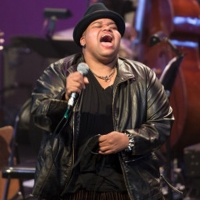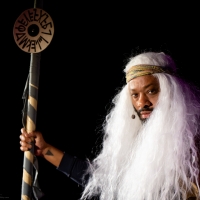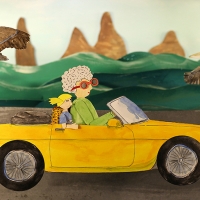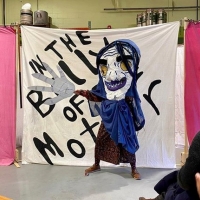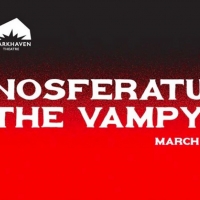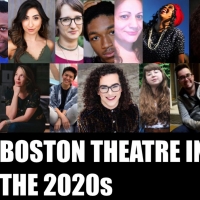BWW Review: WOMEN BEHIND THE CURTAIN by Asian American Theatre Artists Of BostonJuly 1, 2020In Women Behind the Curtain, Michael Lin weaves a narrative about a French spy, Renee, on a mission in Cold War Moscow. When a suspiciously-invested secretary, Aleksandra, joins her in her covert travels, the two are set on an action-packed journey through mistrusted informants, double agents, and scenarios that raise questions
BWW Previews: Juneteenth with Boston's Theatre ArtistsJune 18, 2020With all of the violence being inflicted on the Black community right now, Friday, June 19 (Juneteenth, the celebration of the date that word of the Emancipation Proclamation finally made it to Galveston, Texas) has a lot of offerings from Black artists in the Boston theatre community.
BWW Review: KIND THING; NICE THING at Homesick Play ProjectMay 10, 2020My immediate response to this reading of the play, which had its premiere at Tufts University unfortunately canceled, is that I would love to see how it would change were the actors cast actually artists who use they/them pronouns in their lives.
BWW Review: BELOVED KING: A QUEER BIBLE MUSICAL at OberonMay 7, 2020The score is catchy, folksy, and declamatory in a way that fuses rock sounds with medieval sensibilities, and Kaedon Gray as the prophet, Samuel, begins the show with an expository narration worthy of a mystery play. The stage is set and we launch into the familiar story of King Saul, Jonathan, David, and Goliath from the Book of Samuel.
BWW Review: TORREY PINES at ArtsEmersonMay 7, 2020Beginning in darkness with the sounds of the sea, we launch into a film that directly serves as a companion to a well-constructed soundtrack. Seattle-based director and creator Clyde Petersen opens the autobiographical work with a delightfully familiar reimagining of a coming-of-age story cliche.
Openings of the Closed: IN THE BELLY OF THE MOTHER at Plenty CollectiveMarch 29, 2020Audience members with beers in hand sit down at brewery benches looking toward a set of 8ft tall poles suspending wine-red sheets. A white curtain nestles between them, with black painted text reading In The Belly Of The Mother. A brass band plays a set, against large metal brewing tubs, dressed in monochrome red. We bang out the last bars of a?oeOld Town Road,a?? the crowd cheers, and I grab my rat mask. Sliding it over my face, I can see crescent moons of the crowd past my pointy nose. Through new eyes I see our leading player, Brigid, crumpled over their limbs on the floor.
Openings of the Closed: BELOVED KING, A QUEER BIBLE MUSICAL at OberonMarch 26, 2020The ART's club venue Oberon Theater goes dark. A moment of anticipation hangs in the air before the band begins the opening bars of a?oeChosen,a?? the first original song in the new faithfully adapted queer Biblical musical, Beloved King. Before long, we hear a rich voice, powerful and authoritative as it rings out over the house. It takes several seconds for us to realize that the voice is coming from the balcony above the bar. We turn and see a man with long, stark-white hair dressed in a cloak that seems to be stitched together from scraps of fabric and old rags. He holds a staff with a mysterious disc attached to it. On the disc is an inscription in paleo-Hebrew which translates to a?oeHoly, of the house of the Lord.a??
Openings of the Closed: NOSFERATU, THE VAMPYR at Sparkhaven TheatreMarch 25, 2020A muslin curtain hides the stage, what world could be living behind it? The audience is isolated from each other - two chairs here, three over there, a single person sits in the corner. Is thata??is that a coffin in the corner? Without any warning, a blackout occurs. A video begins to play, featuring scenes from the original 1922 film. And we hear:
Well it's Halloween again
And LA is a bore...
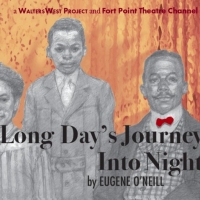
An Introduction: The Openings of the Closed, Theatre of the Pandemic, and LONG DAY'S JOURNEY INTO NIGHTMarch 24, 2020It appears the standard season-subscription model has failed across the board to provide the financial safety net individuals and institutions need to survive a global pandemic, (which is upsetting because the moderate tastes of the elite have dictated what theatres will produce for long enough that it seems we should be getting some return on that investment at this point). Theatrical staffs cannot afford to take a breath as they email ticket-holders assurances which they will later rescind and try to keep their sinking ships afloat. Aging figureheads form their mouths around new words like a?oelivestreama?? and a?oeZooma?? and pass them on to millennial assistant this-and-thats to fill in all the blanks as generation Z associate this-and-thats dig through archival images to keep social media accounts appeasing the gods of the algorithms. There is a need to be immediate. A need to be incessantly productive. A need for quantity over quality. A need to keep up. To be first. While many of us are feeling the burnout from this mad dash for constant output keenly right now, has this not been an underlying system in the theatre for a long time?
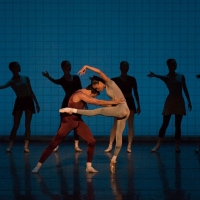
BWW Review: REVOLUTION: DANCE ON THE EDGE at Boston BalletMarch 2, 2020Boston Ballet's rEVOLUTION: Dance on the Edge features three works by pivotal choreographers which stretch the label 'contemporary' to its breaking point. The three pieces, which all premiered between 1957-1987 may trace through the timeline of progress for commercial ballet in America, but I question if anything a ballet company can do could live up to the streamlined, techno aesthetic toted by their marketing team. The title, with its radical use of capitalization, cuts through the smooth blackness on the cover of the program above a photograph of two dancers in an acrobatic pose in green leotards. Inside the booklet, a geometrically conceived sketch of a dancer invites us to an event called 'Turning Pointe' where we can engage with a?oeleading innovators in the arts, sciences, and industry who are building the future in Boston.a?? Another page announces Boston Ballet's upcoming collaboration with Stephen Galloway, the creative movement director for the Rolling Stones, promising to a?oeshatter expectations of what ballet can bea??.
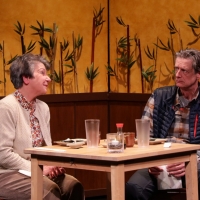
BWW Review: THE TREASURER at Lyric Stage Company of BostonMarch 1, 2020For playwright Max Posner, sitting down to write The Treasurer must have been a feat of de-centering oneself. The narrative takes a dusky, balmy look back at the relationship between his father and his grandmother, a wealthy, New York socialite who lived with dementia in her old age. While the story is, in a way, indirectly autobiographical, it offers few mentions of the playwright himself, uplifting the perspective of the protagonist, his father. In shouldering the role, Ken Cheeseman seems to push Posner's language further into the periphery. His ambulatory addresses to the audience and stoic musings seem to be conceived of in real time, not memorized from a written source. However, Lyric Stage Company's production of The Treasurer is not the standard a?oeI hate my fathera?? solo performance you are likely to see at any undergraduate institution's annual student festival. In fact, though the text is dominated by Cheeseman's character, the production is upheld just as much by him as it is by Cheryl McMahon in the role of Ida, his mother.
BWW Feature: THE FORTUNE TELLER at TC Squared Theatre CompanyFebruary 29, 2020Playwright Christina R Chan has been developing a new work, The Fortune Teller, which will have a premiere staged reading through one of TC Squared Theatre Company's Playwright Salons on March 1. This follows after her 2017 finalist entry for the Eugene O'Neill Play Conference, which also started as a reading in TC Squared's salon. I got to chat with Chan as well as TC Squared artistic director Rosalind Thomas-Clark about how The Fortune Teller has grown and developed through the Playwrights' Lab.
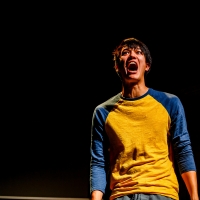
BWW Review: WOLF PLAY at Company One TheatreFebruary 24, 2020For a long time within their history, Company One has cornered the market in Boston for selecting those cutting-edge new works that are able to effectively spark conversations and juxtaposing them against each other in ways that are both productive and incendiary. Hats off to Director of New Work, Ilana M Brownstein, as well as National New Play Network (NNPN) Producer in Residence, Jasmine Brooks, and the entire administrative staff for selecting, through NNPN, such a well-crafted text for a rolling premiere. Jung, who may be best known in Boston for her equally nuanced play, Cardboard Piano, does not stoop to begin with a message, as seems to be in vogue for playwrights right now. She does not set out to teach us anything in a certain, straightforward lecture subdivided into all-too-interchangeable dialogue. Instead, the genesis of her play seems to center around the hypothetical. As one character explains in a moment of meta-theatricality, the evening is nothing more than a series of 'what if?'s. What if a young boy was adopted from Korea by a a?oenot-future-orienteda?? white couple who have given up on having any biological children of their own? What if, once that couple is able to conceive, the boy is again put up for adoption? What if he is adopted by a lesbian couple, and his adoptive father is not entirely thrilled with the prospect of two women raising a boy? By asking these questions and not providing answers, Jung has effectively done what so many playwrights and their commissioners claim to want. She has created a work with the potential to generate conversations that lead to growth and change. Set against the thorough dramaturgical work one can expect from Company One, the production introduces issues within the idea of transracial adoption, America's systems for adoption, and the thin line between a?oevulnerability and violencea??.
Part 4: Making Sure Diversity is EquitableFebruary 21, 2020Michelle Aguillon has been working as an actor and director in Boston for over 25 years. Her work has spanned from Company One to the Nora Theatre to the Umbrella Theatre Company in Concord. How does she think the past decade treated Boston theatre? She says, a?oeI am excited to see more diversity in Boston theatre a?" not only in casting but behind the scenes as well, with writers, directors, and designers. We are going to see more stories about 'the other' a?" those who have endured being mostly shut out or ignored, stories rarely told from their point of view.a??
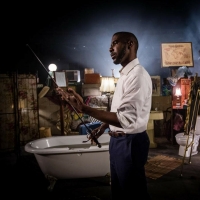
BWW Review: HAMLET 360: THY FATHER'S SPIRIT at Commonwealth Shakespeare CompanyFebruary 15, 2020It is interesting to look at the history of art and entertainment by analyzing the innovations which have been deemed exclusively novelties and written off as fleeting trends by their contemporaries. For film, color and sound were both considered by many to be cheap gimmicks that would quickly fade out of style, within a medium that itself was sure to merely exist for a brief moment in time. Yet, in the 21st century, we still praise the brilliant color work in movies by Wes Anderson and exalt the sounds in the works of Paul Thomas Anderson. When we look, however, at 3-D technologies ranging from the two-tone glasses technology from vintage cinemas, to warped screens which became popular with the release of Oklahoma! (explaining some of the bizarre cinematic sequences in that movie), to those distorted selfies your friend just figured out how to post on Facebook, none seem to have found a lasting hold beyond trendiness or novelty entertainment. Slightly different, though sharing some characteristics, virtual reality technology is gradually developing into a tool which may be the next lasting innovation in entertainment. While the development of the technology has mostly been pounced upon by the video game industry, the theatre and film worlds have found ways to benefit from and expand the possibilities of what audiences can engage with inside a pair of high-tech glasses. Notably, Robert LePage's company, Ex Machina, created an interactive, virtual experience called The Library at Night which let audiences roam through real and imagined libraries, including one underwater conundrum and the Library at Alexandria as it burned.

Part 3: Making Theatre Spaces Safe and AccessibleFebruary 10, 2020Picture it:
You've registered as a criminal justice major at UMass Boston, but there's this really cute girl in your theatre history class. Theatre appeals to you, especially because it gives you a chance to tell stories and to play. You start talking to that cute girl and she watches from the wings as you take on the (almost) titular role in The Importance of Being Earnest in the theatre department's production. You love the chance to be physically funny as the iconic character. You make her laugh.
Flash forward:
You and she are both theatre majors and finally calling each other boyfriend and girlfriend. Upon graduating, you land a spot in the acting MFA program at the University of Florida. Things are going pretty well. To top it all off, you get cast in your dream role, Seaweed Stubbs in Hairspray, at Priscilla Beach Theatre. You'll be spending the summer dancing and making people laugh in a charming little barn by the beach in Plymouth. And the best part? Your girlfriend will also be in the cast, playing Lorraine.
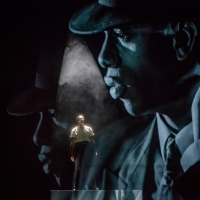
BWW Review: DETROIT RED at ArtsEmersonFebruary 7, 2020In David Mamet's book On Directing Film, he breaks down the way a linear narrative can be conveyed by placing images in direct contrast to each other. a?oeThe dream and the film are the juxtaposition of images in order to answer a question.a?? Certainly, with a majority of the action taking place upstage of a scrim and the fusion of filmed and live material, ArtsEmerson's Detroit Red, an original play by Will Power about Malcolm X's early adult life in Roxbury, leaves one feeling more as though one has watched a movie or woken from a dream than sat through a performance. Recently, I also saw Gloria: A Life, which is playing at the American Repertory Theatre. While I admittedly found the show to be trite and pandering, it obtusely fused projection effects with live performance in a way that felt cheap, gimmicky, and more like a new SnapChat filter than anything else. Contrast that with Ari Herzig's film work for Detroit Red, which snaps the audience effectively between viewpoints in black and white and splays broad images across the haziness of Adam Rigg's nondescript set. The success of the production lies in the success of the filmed elements, which establish a framing device, pinpointing the action to an exact moment in time. Additionally, the projections act as effective abstractions, allowing the actors to waver between realism and poetry as photos of their faces appear as oversized watermarks in space. Lighting designer Alan Edwards equally contributes to the cinematic feel of the piece. Sharp shafts of light slice through open space and act, ingeniously, as the camera lens might in film, focusing our attention on specifics and the relevant details. Aside from a few extraneous hat changes for the three actors who take on all the roles in the piece, between the work of Herzig, Rigg, and Edwards, the performance seems to be a study in the logistics of jump-cuts or cross-fades in real time. Adding to the film-instead-of-theatre feeling in the space, the performance actively roused and engaged the audience, which had a huge swathe of Boston school groups present. The crowd felt comfortable verbalizing responses, in part, because of our physical separation from the action presented to us, and to be able to laugh, cheer, gasp, and grimace in solidarity with those around you is a rare treat.







